US election 2016: How Clinton and Sanders are vying for black voters
- Published
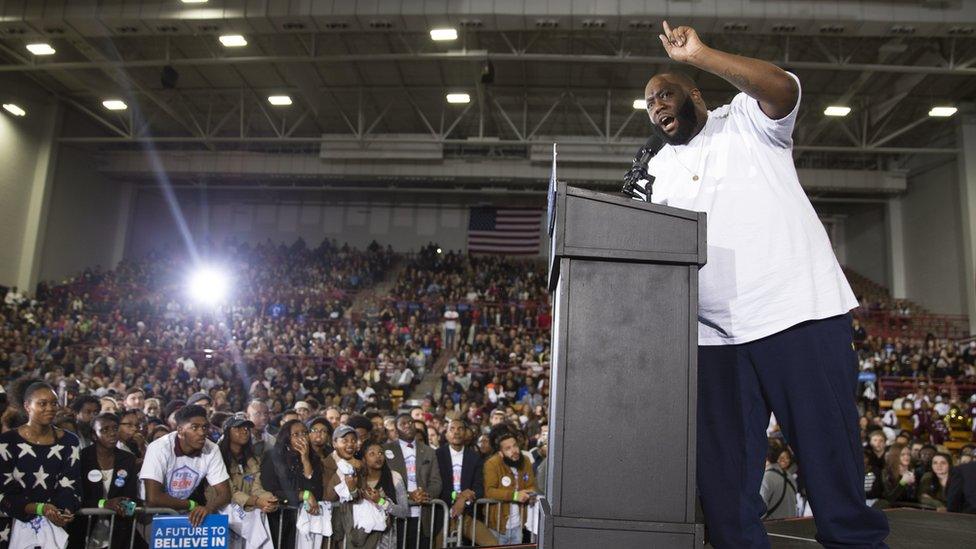
Killer Mike speaks at a Bernie Sanders rally
As the competition for the Democratic nominee for president heats up, both Bernie Sanders and Hillary Clinton are courting black voters.
Mrs Clinton's "firewall" strategy is based on using the strength of her support in the black community to protect her against a surging Mr Sanders.
Meanwhile, the Vermont senator has been making in-roads with younger voters, external, scoring support from leading figures like writer Ta-Nehisi Coates and rapper Killer Mike.
It is evidence that there is no such thing as the "black vote" - that black Americans do not vote as a monolith, and that each individual black voter has individual criteria and concerns that determine who they favour.
Still, gaining support from black voters is important in this closely-fought contest. With that in mind, how are the two of them targeting black voters?

Policy
Both candidates think they have a winning prescription for improving the lives of African Americans.
Mr Sanders' policy is focused on the economic struggles of middle and lower-class Americans, and how that translates to inequity in the African-American community.
His website lays out a more comprehensive strategy: "We must pursue policies to transform this country into a nation that affirms the value of its people of colour. That starts with addressing the five central types of violence waged against black, brown and indigenous Americans: physical, political, legal, economic and environmental."
Mrs Clinton, the former US Secretary of State, has spoken about the systemic problems of racism that she says cannot be solved by economic means alone.
"We aren't a single-issue country," she said this week in Harlem, in a rebuke of Sanders. "We face a complex set of economic, social and political challenges. They are intersectional."
Both talk about issues like reducing mass incarceration rates and improving relationships with the police.

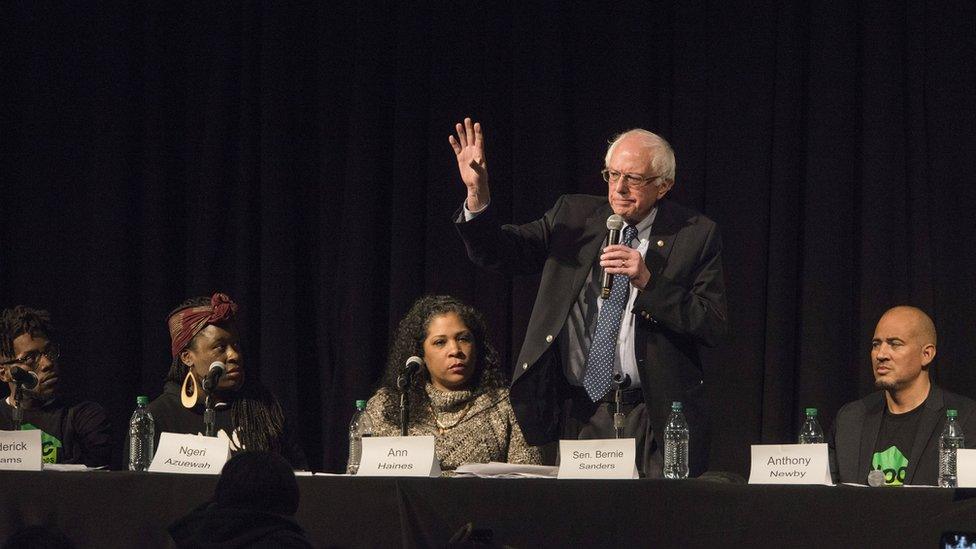
Sanders at a forum on race in Minnepolis
Direct appeals
Both Mrs Clinton and Mr Sanders have gone out of their way - literally - to speak to black audiences.
Last week, the senator spoke at a black community forum in Minnesota - where primary voting takes place on 1 March, or Super Tuesday - while the former first lady this week travelled to Harlem to give a speech about race relations. New York will not vote until 19 April.
Both have been accused in the past of being tone deaf on race. Last summer, Mr Sanders was the target of Black Lives Matter protesters, who disrupted a rally in Seattle to mark the one-year anniversary of the death of Michael Brown, the unarmed black teenager who was killed in Ferguson, Missouri, by a white police officer.
Mrs Clinton used the phrase "all lives matter" at an African-American church in Missouri last June - a term many feel is dismissive of the specific claims of black activists.
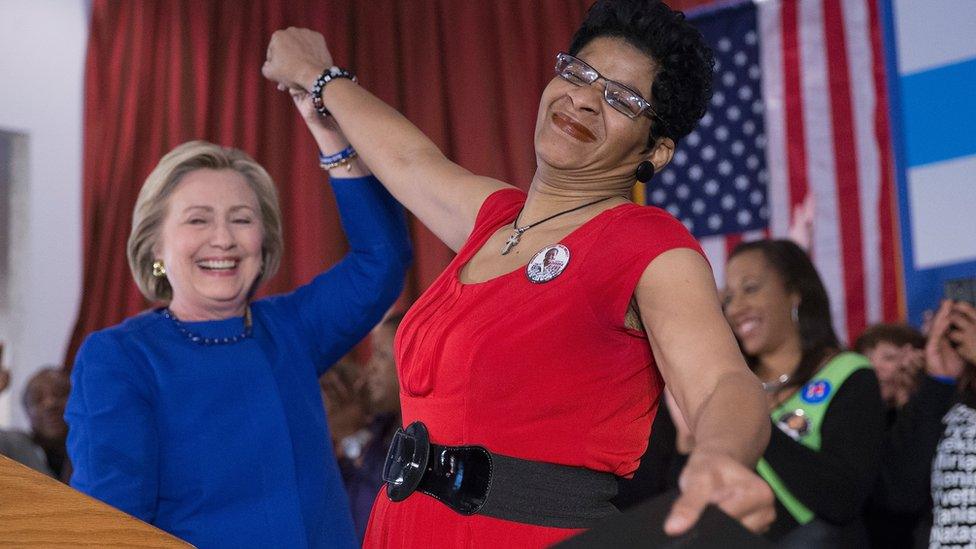
Clinton at a rally with Geneva Reed-Veal, the mother of Sandra Bland, who died in police custody
But Mrs Clinton seems to have corrected her course. Her Harlem speech was hailed by some writers as groundbreaking for a candidate of her stature.
In New York Magazine, writer Rembert Browne, external expressed amazement that the "white woman Establishment presidential candidate" discussed the Flint water crisis in a way that "chastis[ed] her own privilege" when she suggested that the reaction from state officials would've been more swift if it occurred in a "wealthy white suburb of Detroit".
In the meantime, Mr Sanders faced mixed reviews for his performance in Minnesota. He received loud applause for many of his proposals, but at one point was accused of being afraid to say the words "black" and "reparation" - a reference to the belief that African-Americans deserve compensation for the practice of slavery.
One strategist told Buzzfeed that, external "the tone of the forum reflected a fear in the black community that government largess promised by candidates like Sanders will never make it to the black community," and that the candidate "has to talk about how his plans will specifically put money into black communities".
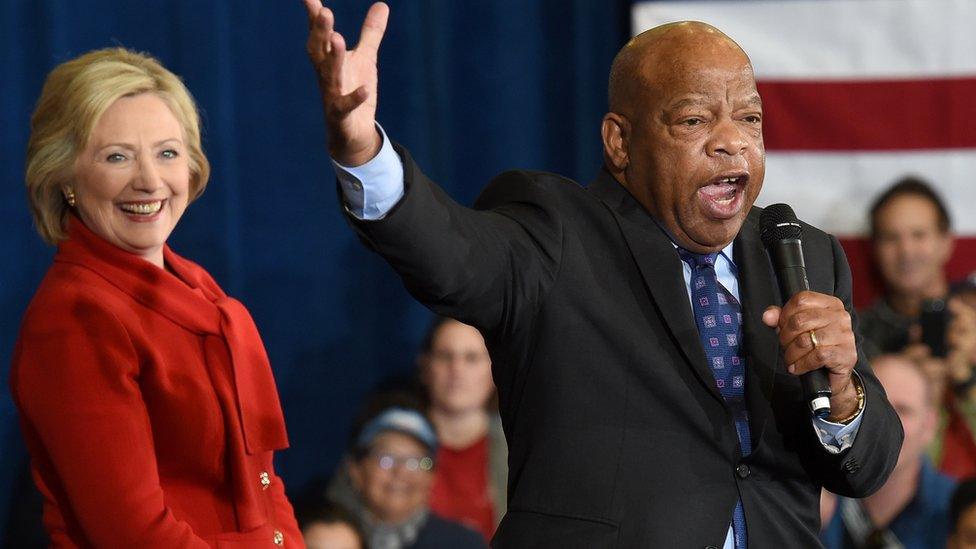
Congressman John Lewis speaks at Hillary rally

Endorsements
Both candidates have found endorsements from within the Black Lives Matter movements - Erica Garner, the daughter of the late Eric Garner, has made a commercial for Bernie Sanders, while her mother has endorsed Hillary Clinton. Mr Garner was killed after being held in a chokehold by a police officer in New York.
Mrs Clinton also appeared at a Chicago event with the mother of Sandra Bland, the woman who died in police custody after being dragged out of her car during a traffic stop.
Both Democratic contenders have also met with more establishment figures. Mrs Clinton has secured the endorsement of the Congressional Black Caucus, while Mr Sanders has an endorsement from Ben Jealous, the former head of the NAACP (National Association for the Advancement of Colored People). Vincent Ford, the second-in-charge Democrat in the Georgia state senate, recently changed his endorsement from Mrs Clinton to Mr Sanders.
"Clinton was the person who assumed she would get black voters, and Bernie Sanders knew he needed to work for them," said Eric Guster, a political and legal analyst. "And he came out of the gate working for them."
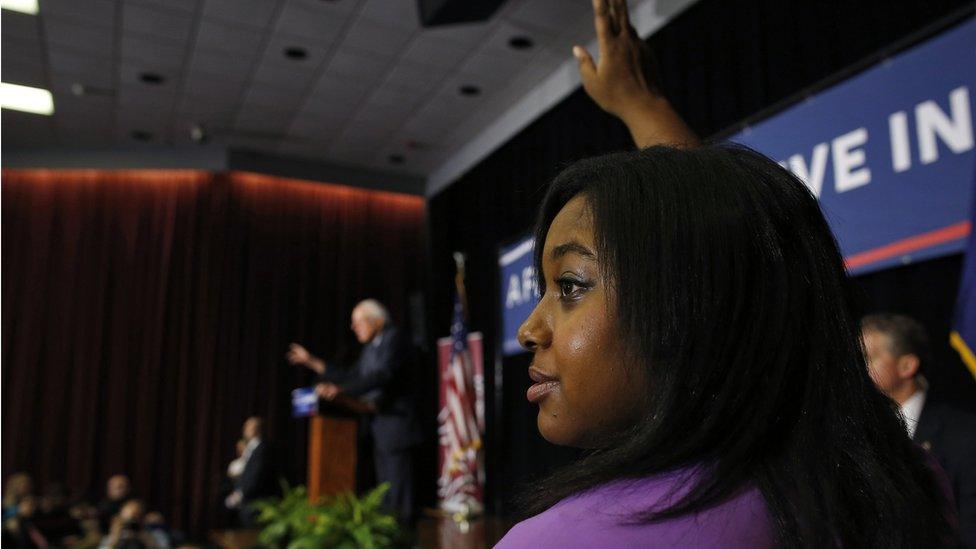
Erica Garner, daughter of Eric Gardner - who died after being put in a chokehold a police officer at Bernie Sanders rally
Despite accusations that both candidates are pandering to black Americans, New York Times contributing writer Michael Eric Dyson said on a recent podcast that the Democratic candidates should "pander on".
"I'm glad somebody's working hard to get the black vote," he said. "We need the attention. The people whose backs are against the wall, whose water is essentially being poisoned, need the attention of the federal government."
Currently Mrs Clinton appears to have greater support from black voters in South Carolina, where Democrats vote next weekend, She leads Mr Sanders among likely black voters by 40 points, according to a Bloomberg poll, external.
But Mr Sanders has shown to be more resilient than many Democratic insiders initially anticipated - and it looks like it's going to be a long campaign.
Additional reporting by Andrew Desiderio